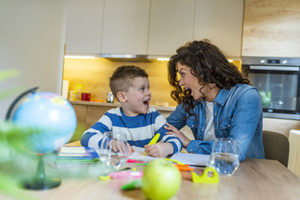“Don’t run across the street.” “Stop interrupting when the teacher is talking.” “Stop yelling when you’re playing the Xbox.” “Stop kicking the fridge.” “You need to redo your homework assignment because you rushed through it.” “Can’t you just sit still?”
Children with ADHD receive frequent negative messages like these from their parents, teachers, coaches, other adults, and sometimes even their own friends. Like ocean waves that continually hammer the shore, these constant negative messages affect a child’s self-esteem. By their twelfth birthday, children with ADHD receive around 20,000 negative messages, says William W. Dodson, MD.
Dr. Dodson, a psychiatrist in Colorado, specializes in treating adult ADHD. He sees how negative messaging received as a child influences the way a person feels about themselves as an adult.
“Most grow up with the feeling that they are less than, uncool, unwanted, defective, incompetent, and ‘damaged goods,’” says Dr. Dodson. The good news for parents is that there are ways to reduce these effects of negative messaging to help their child develop a healthy sense of self-esteem.
Finding the positive
Parents try their best when raising kids with ADHD. But you may feel so pushed and pulled from one day to the next that it sometimes seems impossible to do one more thing. It’s easy to get caught in the negativity trap—only pointing out your child’s behaviors to correct them. If you do remember to give them praise, it’s often after the fact, as you rush from one extracurricular activity to the next.
But, if you want to help improve your child’s self-esteem, it may not be as time-consuming as you think.
One way to focus on the positive is by making a list of your child’s strengths and determine which of those is due to their ADHD, says Max Wiznitzer, MD. A pediatric neurologist at Rainbow Babies and Children’s Hospital in Cleveland, Ohio, Dr. Wiznitzer is a member of CHADD’s board of directors and editorial advisory board, and serves as co-chair of the professional advisory board.
Once you’ve made a list, he says, talk with your child about how their ADHD-based strengths can help them. Pointing out their strengths flips the viewpoint of ADHD as only negative and provides you with opportunities to genuinely praise your child.
Constructive praise is another simple way of reducing the effects of negative messages. Instead of using general praise like “good job,” provide intentional, thoughtful praise that reflects an action your child took or effort they made. Praising your child’s effort greatly helps to build their self-esteem, says Cindy Goldrich, EdM, ADHD-CCSP.
“If we want to help our kids develop a ‘growth mindset,’ one where they believe that their intelligence and expertise can be developed through their effort and learning, then we must be careful to comment on their process more than their result,” she says. Ms. Goldrich, a mental health counselor and certified ADHD coach, believes helping kids develop better self-esteem comes from focusing on the process not the result. This is especially true when it comes to grades. Did your child work hard on an assignment but they didn’t receive an “A” grade? Praising the hard work they put in is more important than commenting on the grade received.
“Praise has the ability to build self-esteem, autonomy, self-reliance, self-awareness, and motivation for learning more,” she says. The challenge for busy parents is to remember to give praise, says Ms. Goldrich. Make a point to find opportunities to provide constructive, positive feedback. Because children with ADHD tend to be focused on the moment, if you can, provide praise immediately after your child has demonstrated a consistent effort or kind action, so they can better link the action with praise and are more likely to strive to repeat the effort.
Suggestions from parents
CHADD asked parents from our online parent community, “What are some ways that you provide encouragement and praise for your child with ADHD?” Here is what they said:
- Focus on the process or progress, not the results.
- Make sure to show appreciation or gratitude for kind gestures, no matter how small with a “thank you” or “that was helpful.”
- If you don’t have time in the moment to acknowledge positive behaviors, make sure to circle back around later by saying “I saw that you did ‘x’ yesterday. It was helpful to me/our household because…”
- Make it a priority to find those opportunities when your child has done something that took a great effort or was difficult for them to do.
- Keep samples of your child’s schoolwork from the beginning of the year, and then at the end of the year, show them the progress they’ve made.
- When your child is working on a skill, ask them to identify which finished product they felt they did their best on. This can help them self-identify their best work and help them connect their hard work and effort even if they find the task difficult.
- Make a list of values that your family feels are important. Pick one for the week and praise your child for times when they’ve demonstrated that value.
Further reading:


